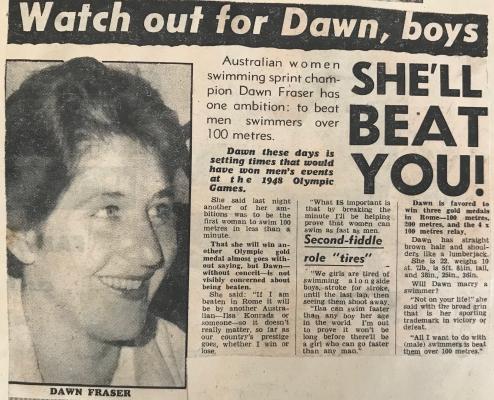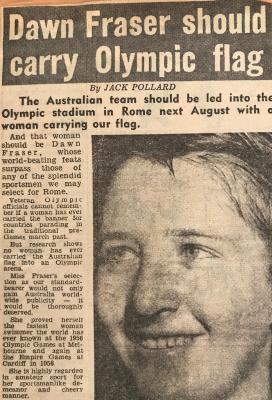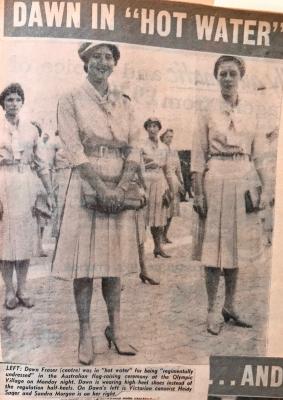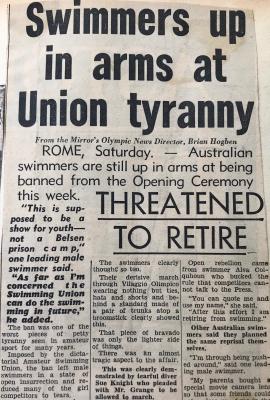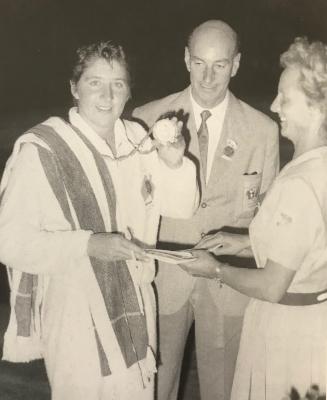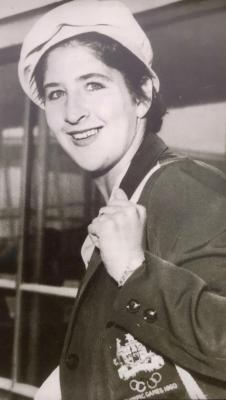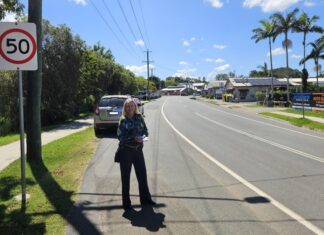On the night of August 29, 1960 – ‘Our Dawn’, a very apt title because she has resided in Noosa Waters for many years, was again Olympic Champion in the 100m Freestyle. She won in 1:01.2, breaking her 1956 Melbourne Olympic record.
At the Stadio de Nuoto in Rome she became the first Australian to defend an Olympic swimming title. The headlines in Australia were amazing: “Acclaim for Fraser After Easy Swim Win”. AAP’s Alan Clarkson proclaimed “Dawn Fraser established herself as the greatest woman swimmer Australia has produced.”.
But, within twenty-four hours things changed. In her autobiography Dawn: One Hell of a Life, published in 2001, the chapter on Rome was titled, ‘The Best of Times, the Worst of Times’. Why?
So much has been written, ‘warts and all’, in newspapers, magazines and books about Dawn, considered by her peers and commentators as our greatest Olympian.
Throughout 1960, sports journalists had touted Fraser should be flagbearer for the Opening Ceremony – “she would be the first woman, … she is highly regarded in amateur sport for her sportsmanlike demeanour and cheery manner.” An unnamed swimming official even recommended a lightweight flagpole be built specially so that Dawn’s strength wouldn’t be taxed.
It didn’t happen. Indeed, all swimmers were banned from marching or even sitting in the stands for that special Olympic ceremony. Headlines such as “Swimmers up in arms at Union tyranny” in the Australian press reflected the mood of the swimmers, and it most definitely affected the morale of the team. Dawn acquiesced to the ‘ban’ – she and Lorraine Crapp said, “We rested all afternoon, and we needed it”.
Upon arrival in Rome, Fraser suffered from ‘Rome tummy”, which affected most of the Australian team, especially 1956 Olympic champion Jon Henricks, who didn’t medal at all.
Dawn trained with Olympic champion Jon Henricks because “I had always based my swimming times on those of the men; it was as integral part of my regime.” Earlier in the year, under the newspaper headline. “Watch out for Dawn boys, she’ll beat you!”, Dawn said, “what is important is that by breaking the minute in the 100m I’ll be helping to prove that women can swim as fast as men.”
In spite of her desire to ‘break the minute in the 100m Freestyle Final, “Coach (Harry Gallagher) and I decided that I shouldn’t swim flat out in an effort to break the minute…. I’m still weak from loss of weight, so I swam the first leg easily and came home hard”. Her main rival, American Chris von Saltza was with Dawn at the turn but I ‘pulled away to set another Olympic record in 61.2 seconds.
Dawn was to have swum in five events but her health was such that Gallagher advised her to withdraw from the Butterfly races; the ramifications of that decision were widespread.
Australian journalist Harry Gordon, later a co-author of one of Dawn’ several biographies, wrote summarily in 1961:
… under the stress of international competition, she did a couple of silly things; she lost her temper and struck a team-mate (Jan Andrew), and she refused to swim in a relay race. Her scuffle with Jan Andrew was unjustified, but not all that hard to understand in the context of strained temperaments – and I believe she was simply following her coach’s instructions by refusing to take part in the relay. Dawn’s big mistake was to cross officialdom – and this can be a dangerous thing in Australian swimming. She took notice of her coach rather than the manager of the swimming team.
Since Dawn, the world-record holder of the 100m Butterfly, had withdrawn from that even, Jan Andrew was Australia’s sole representative. The selectors surmised that Andrew be rested for her final and Fraser should swim the Butterfly leg in the heat of the Medley Relay.
In Townsville “I strained my stomach muscles quite badly in butterfly training and was advised by the doctor to give away this strenuous stroke.” Before leaving Australia, “I was genuinely under the impression that I wasn’t in the medley, and (in Rome) was told 1.5 hours beforehand that I had to (swim) .. . I argued and I refused”.
Jan Andrew won a bronze medal (1:12.2) in the Butterfly, Alva Colquhoun volunteered to swim the Butterfly leg in the Medley Relay heat, and Australia won silver (Marilyn Wilson, Rosemary Lassig, Janice Andrew, and Dawn Fraser).
Still suffering from gastric problems and mental concerns because of relations with the team, Fraser finished fifth in the 400m Final. Her performance was so ‘not-Our Dawn’; some officials stated that she hadn’t tried. Dawn reacted – “I’ve never thrown a race in my life”.
In the 4 x 100m Freestyle Relay, Australia came second (4:11.3) to the USA team which set a new world record (4:08.3). Fraser swam the starting leg followed by Ilsa Konrads, Lorraine Crapp and Alva Colquhoun. Dawn’s time was 60.6 seconds – an Olympic record.
Despite extolling ‘Olympic record-breaking Dawn’, in winning gold in the 100m Freestyle, and silver medals in the Medley and Freestyle Relays, the press made much of the incidents.
Some were petty. For example, Fraser wore high-heeled shoes at the official welcome and flag-raising ceremony of the Australian team to the Athletes Village.
On the victory dais when receiving her individual gold medal, Fraser wore a white tracksuit with a map of Australia embroidered on the front instead of the national one. It was a gift from Larco, dressmakers where Dawn had worked when she left school: “it was made of light nylon … comfortable in hot weather.”
“Looking back, the white tracksuit was not the smartest move I’ve ever made. But certainly not a defiant or intentionally rebellious act.” Dawn wrote: “Not a single official said anything about the tracksuit during the Games but … six months later, it appeared they were all upset about it. … I liked the tracksuit and my official one was wet.”
The ASU report indicated they expected Olympians “to do their very best in and out of the water, and definitely obey the instructions of the appointed manager”. Fraser was banned from swimming in international competition for two years.
While still under the ’ban’ from international swimming by the ASU, but after having won 7 Olympics medals (3 gold and 4 silver), Dawn Fraser received the prestigious Helms Award – now known as the ‘World Trophy’ – in 1961.
Having already ‘broken the minute’ for the 100m Freestyle in 1962, Dawn again won gold at the 1964 Tokyo Olympic Games in another Olympic Record (59.5 secs). Again, her ‘behaviour’ out of the swimming pool was ‘unbecoming’ according to the ASU. She was banned again – for ten years. But that is another story.
P.S. `There could be many postscripts but these two are of significance:
While attending the 1968 Mexico Olympics as a spectator, Fraser was challenged to swim the 100m in under 62 seconds. Long retired and with little preparation, she swam it in 60.2 seconds. A few days later, American Jan Henne won the 100m Final in exactly one minute. No Australian swimmer made that Final.
In her speech in Townsville at a reunion of veteran swimmers in 2000, Dawn Fraser acknowledged, “I do regret my treatment of Jan Andrew in Rome… I want to tell her publicly that I apologise. If I had known then what I know now it would never have happened.”
Later that evening, Jan Andrew and Dawn Fraser embraced and reminisced.
(Ian Jobling is Honorary Director of University of Queensland Centre for Olympic Studies)

